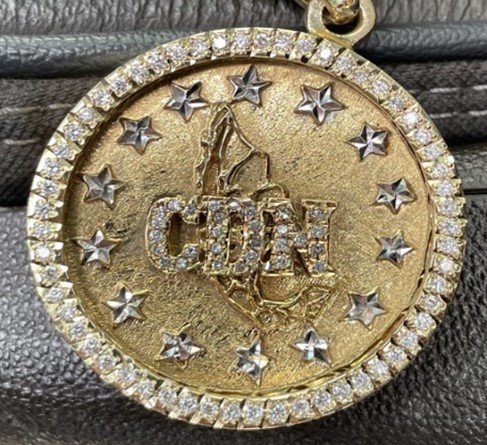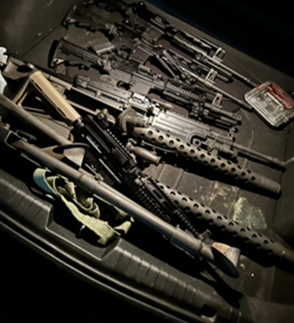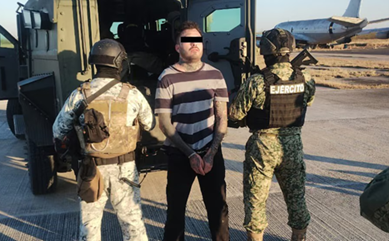Cartel Engaged in Drug and Arms Trafficking, as well as Deadly Violence, 2022 Attack on U.S. Consulate
WASHINGTON — Today, the Department of the Treasury’s Office of Foreign Assets Control (OFAC) sanctioned two high-ranking members of the Mexico-based Cartel del Noreste (CDN), formerly known as Los Zetas. CDN, one of the most violent drug trafficking organizations in Mexico and a U.S.-designated Foreign Terrorist Organization (FTO), exerts significant influence over the border region, especially near the Laredo/Nuevo Laredo point of entry. These sanctions underscore our commitment to target CDN and other violent cartels involved in drug trafficking, human trafficking, arms trafficking, and other heinous crimes that are endangering the American people.
“In working toward the total elimination of cartels to Make America Safe Again, the Trump Administration will hold these terrorists accountable for their criminal activities and abhorrent acts of violence,” saidSecretary of the Treasury Scott Bessent. “CDN and its leaders have carried out a violent campaign of intimidation, kidnapping, and terrorism, threatening communities on both sides of our southern border. We will continue to cut off the cartels’ ability to obtain the drugs, money, and guns that enable their violent activities.”
Today’s action was coordinated with Homeland Security Investigations (HSI); the Bureau of Alcohol, Tobacco, Firearms and Explosives (ATF); and the Drug Enforcement Administration (DEA). This action was also closely coordinated with Mexico’s Financial Intelligence Unit, Unidad de Inteligencia Financiera.
The action was taken pursuant to Executive Order (E.O.) 14059, which targets the proliferation of illicit drugs and their means of production, and pursuant to E.O. 13224, as amended, which targets terrorists and their supporters.
CARTEL DEL NORESTE

CDN is a terrorist organization primarily based in the Mexican states of Tamaulipas, Coahuila, and Nuevo Leon. CDN has been involved in narcotics trafficking, human trafficking, arms trafficking, money laundering, vehicle theft, and oil theft. They have also been involved in terrorist activity to intimidate American citizens and local communities in Mexico, including engaging in acts of extortion, kidnapping, and murder.
In March 2022, CDN hit the U.S. Consulate in Nuevo Laredo with gunfire and grenades after the arrest of a CDN member who was wanted in Mexico for terrorism, homicide, and extortion. The U.S. Consulate closed for almost a month due to this incident. This was a retaliatory act intended to intimidate the American diplomats serving their country internationally.
On February 20, 2025, the U.S. Department of State identified CDN as an FTO and as a Specially Designated Global Terrorist (SDGT). Prior to its designation as an FTO, CDN, then known as Los Zetas, was identified by the United States as a significant foreign narcotics trafficker on April 15, 2009 pursuant to the Foreign Narcotics Kingpin Designation Act (Kingpin Act) for playing a significant role in international narcotics trafficking. On July 24, 2011, Los Zetas was named as a transnational criminal organization (TCO) in the annex to E.O. 13581. On December 15, 2021, OFAC designated CDN pursuant to E.O. 14059.
SANCTIONING KEY MEMBERS OF CARTEL DEL NORESTE

Miguel Angel de Anda Ledezma (De Anda) is a high-ranking member of CDN residing in Nuevo Laredo, Tamaulipas. De Anda oversees the procurement of guns and ammunition for CDN. In this position, De Anda has overseen payments to facilitators and straw purchasers in the United States and organized the delivery of firearms to Nuevo Laredo. These straw purchasers made false representations to secure firearms from American businesses, who fell victim to the cartel’s lies. Some of the weapons have been used in terrorist activity. One of the weapons purchased in this arms-trafficking conspiracy was recovered after CDN attacked Mexico’s army, Secretaría de la Defensa Nacional (SEDENA), during one of SEDENA’s patrols in March 2024.
Ricardo Gonzalez Sauceda (Gonzalez), residing in Nuevo Laredo, Tamaulipas, was the second-in-command of CDN prior to his February 2025 arrest by Mexican authorities. In this capacity, Gonzalez led an armed enforcement wing of CDN. Gonzalez has benefitted from these trafficked firearms in his various criminal activities, including attacks on Mexican police and military, and drug trafficking. On February 3, 2025, Mexican law enforcement arrested Gonzalez in connection with the August 17, 2024 CDN attack on the Mexican military, which killed two Mexican soldiers and injured five. Mexican authorities indicated that, at the time of arrest, Gonzalez was in possession of a rifle, a handgun, 300 grams of methamphetamine, and a package of 1,500 fentanyl pills.
OFAC’s designation of De Anda and Gonzalez was the result of strong partnership and coordination with HSI San Antonio, ATF San Antonio (Operation Southbound Firearms Trafficking Task Force), and the DEA.

De Anda and Gonzalez are being sanctioned pursuant to E.O. 14059 and pursuant to E.O. 13224, as amended, for being owned, controlled, or directed by, or having acted or purported to act for or on behalf of, directly or indirectly, CDN.
Concurrent with this action, OFAC is also updating CDN’s entry on the Specially Designated Nationals and Blocked Persons List (SDN List) to reflect the FTO’s most current name, consistent with the February 20, 2025 U.S. Department of State designations. Administrative updates to the SDN List are important to preserving its accuracy and integrity.
SANCTIONS IMPLICATIONS
As a result of today’s action, all property and interests in property of the designated persons described above that are in the United States or in the possession or control of U.S. persons are blocked and must be reported to OFAC. In addition, any entities that are owned, directly or indirectly, individually or in the aggregate, 50 percent or more by one or more blocked persons are also blocked. Unless authorized by a general or specific license issued by OFAC or exempt, OFAC’s regulations generally prohibit all transactions by U.S. persons or within (or transiting) the United States that involve any property or interests in property of designated or otherwise blocked persons.
Violations of U.S. sanctions may result in the imposition of civil or criminal penalties on U.S. and foreign persons. OFAC may impose civil penalties for sanctions violations on a strict liability basis. OFAC’s Economic Sanctions Enforcement Guidelines provide more information regarding OFAC’s enforcement of U.S. economic sanctions. In addition, financial institutions and other persons may risk exposure to sanctions for engaging in certain transactions or activities with designated or otherwise blocked persons.
Furthermore, engaging in certain transactions with the persons designated today entails risk of secondary sanctions pursuant to E.O. 13224, as amended. Pursuant to this authority, OFAC can prohibit or impose strict conditions on the opening or maintaining in the United States of a correspondent account or a payable-through account of a foreign financial institution that knowingly conducted or facilitated any significant transaction on behalf of an SDGT.
Exports, reexports, or transfers of items subject to U.S. export controls involving persons included on the SDN List pursuant to E.O. 13224, as amended, may be subject to additional restrictions administered by the Department of Commerce, Bureau of Industry and Security. See 15 C.F.R. section 744.8 for additional information.
The power and integrity of OFAC sanctions derive not only from OFAC’s ability to designate and add persons to the SDN List, but also from its willingness to remove persons from the SDN List consistent with the law. The ultimate goal of sanctions is not to punish, but to bring about a positive change in behavior. For information concerning the process for seeking removal from an OFAC list, including the SDN List, please refer to OFAC’s Frequently Asked Question 897 here, and to submit a request for removal, click here.
For more information on the persons designated today, click here.
###
